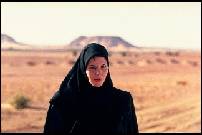|
|
||||
|
|
by Donald Levit  Finding only the narrowest of alleyways toward redemption through admission of guilt and the selfless love of woman, Nathaniel Hawthorne was deeply aware, in Berkshires neighbor Herman Melville’s phrase, of the power of evil ten times black and came to doubt the artist’s right to depict the foul cavern that is humanity’s heart. Across the ocean, Gustave Flaubert wrote that though the public wants its illusions flattered, “you don’t make art out of good intentions.” Another medium, another century, but Algerian filmmaker Merzak Allouache also feels called upon to diffuse accusations of pessimism directed against his work. Self-exiled for safety in France since his 1993 Bab El-Oued City portrayed the rise of fundamentalist Islamic brainwashing and revolution in his already scarred homeland, Allouche today speaks of the destruction of culture, including cinema, and of a “slow motion amnesia” that forgets the deaths and violence as they occur, in a rush to enjoy the moment even while young people flee overseas or else enter the ranks of jihad, holy war. The huge North African country’s hundred years’ ties with Specifically, the director’s script found its basis in young field journalist Baya A., who had literally gone through the wars and agreed to furnish story elements which have then been elaborated with other “real events.” Aside from a formidable heroine and stark, engrossing photography, the film is notable in its refusal to define easy villains. Both “freedom fighters” and the state are at the same time brutes who target enemy and innocent alike; fanaticism has its roots in others’ inhumanity; beards and blue jeans mingle on the streets; social inequalities breed revolt against everything and anything; and “narrow-minded Muslim” Hakim (Karim Bouaiche) has a level of understanding, confusion and complexity that is intended to hint “a moment of regeneration for him in spite of the sadness.” “Scared to death but I’ve got to go,” buying a figure- and hair-hiding hidjab in Paris, Beur (French-born Algerian) Yasmine Hattou (Marie Brahimi) boards a Khalifa flight to Algiers. Ostensibly she goes to visit an uncle and his former feminist activist daughter, but her true agenda is to find fiancé Rachid (Nazim Boudjenah), who seven months earlier had disappeared, unannounced, to enlist in the army of his birthplace. In this unfamiliar other world, she is helped by the battle-hard but kind military Officer (Abdelkrim Bahloul) who calls her “very brave, or crazy,” takes her home to his modern wife Aïcha and baby, and tells of the terrorist/rebel ambush that left thirty-five soldiers dead and two unaccounted for but presumed tortured and executed, among them the man Yasmine variously describes as her “brother” or “cousin.” As she insistently continues south in her search, the taxi is also ambushed, three others slaughtered, and she taken alive for the “Emir’s” pleasure. During a fortuitous helicopter attack on the Afghan-trained extremist camp, she is helped to safety by surly, Kalashnikov-toting Hakim, from whom she soon manages to escape. After a return to the Officer in spy- and informer-filled Médéa, she catches a bus to Timimoun, rustic capital of the Touareg or famous “Blue Men.” A fellow passenger is the now clean-shaved Hakim, sullen and yet boyishly sweet, who opens himself to her and whom she in turn saves at a nasty military checkpoint. Dismissed, the young man still follows at a distance as self-assumed protector, as she interviews the father and venal brother of Abdallah (Bouhalka Abdelhamid), the second missing soldier. Driven to shrieking madness by the mutilations witnessed from hiding, he is being cared for in the incongruous, and rather humorous, desert truck-stop brothel of blonde, blind Aldija (Michèle Moretti). Writing in the Chinese notebook-diary which will be significantly lost then found, Yasmine heads to the dilapidated site with its three sunglassed brunette, blonde and black African girls, and a resolution of Rachid’s fate. There, amidst a slow return to life and love, a New Year’s Eve celebration, and the story’s first tentative smiles and laughter, violence will suddenly erupt, for reasons too complex and subconscious for elucidation. That which should be triumph becomes sudden sadness. Allouache neither moralizes nor sledgehammers. The tragedy is for all, set to the background of nature’s awful desolateness and to original, regionally varying music by Gnawa Diffusion: “of veils, rape, massacre and the arbitrary, And Algeria is dead while another one rises.” (Released by ArtMattan Productions; not rated by MPAA.) |
||
|
© 2025 - ReelTalk Movie Reviews Website designed by Dot Pitch Studios, LLC |



